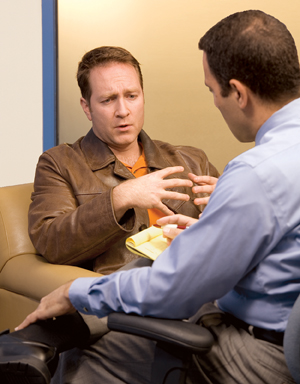Treating Affective (Mood) Disorders
Treating Affective (Mood) Disorders
Affective disorders are disorders of mood. One is depression. Another is bipolar disorder (also called manic depression). They are often treated with medicines and therapy. Talk with your healthcare provider. He or she can tell you more about treatments that can help you. A hospital or mental health clinic can also provide help.
Treatments for depression
Depression is a common mood disorder. It causes a person to feel sad, worthless, helpless, and hopeless. It makes you lose interest in things that used to give pleasure. Treatment includes medicines and talk therapy. Antidepressant medicines change levels of brain chemicals to help a person feel better. Talk therapy involves speaking with a trained counselor about your thoughts. Most people with depression do best when they use both medicine and talk therapy. In cases where other treatments don’t work, a treatment called electroconvulsive therapy or ECT may be suggested. This uses electric impulses to ease depression. There are different types of depression and your treatment options will depend on the type of depression you have. In some cases treatment may be short-term (6 months or less). In other cases medicines may be needed on a long-term basis.
Treatments for bipolar disorder
People with bipolar disorder have intense mood swings. They move between deep sadness and out-of-control highs. Bipolar disorder is a serious, complex chronic illness. And just like diabetes or heart disease, requires lifetime management. This condition is treated with medicines such as lithium. It helps even out moods and prevents mood swings. If lithium is not appropriate, a medicine that works in a similar way may be used instead. Talk therapy can also help. This involves talking to a trained counselor about feelings and relationships, and managing your bipolar illness. He or she can give support during tough times.
Resources
The sources below can tell you more. They can also give names of clinics near you that offer treatment and free screenings.
Depression and Bipolar Support Alliance 800-826-3632 www.dbsalliance.org
International Foundation for Research and Education on Depression www.ifred.org
National Alliance on Mental Illness (NAMI) 800-950-NAMI www.nami.org
National Institute of Mental Health 866-615-6464 www.nimh.nih.gov
National Suicide Prevention Lifeline 800-273-TALK (8255) www.suicidepreventionlifeline.org This resource is open 24 hours a day, 7 days a week. The counselors speak English and Spanish. They can provide immediate crisis intervention and information on local resources. It is free and confidential.
Updated:
May 27, 2017
Sources:
Bipolar disorder in adults: Choosing maintenance treatment. UpToDate., Unipolar depression in adults: Treatment with antidepressant combinations. UpToDate.
Reviewed By:
Ballas, Paul, DO,Fraser, Marianne, MSN, RN
